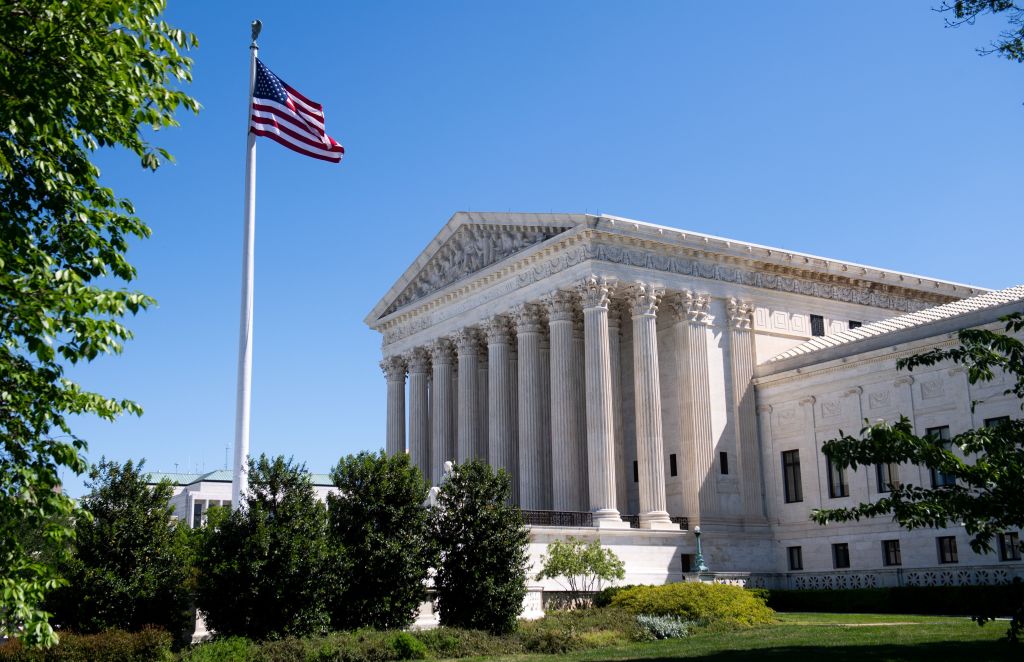Supreme Court upholds Arizona voting restrictions in 'a sign of what's to come'


A free daily email with the biggest news stories of the day – and the best features from TheWeek.com
You are now subscribed
Your newsletter sign-up was successful
The Supreme Court has upheld voting restrictions in Arizona, ruling two laws don't violate the Voting Rights Act.
In a 6-3 decision, the court upheld an Arizona policy requiring ballots to be tossed if they're cast in the wrong precinct, as well as a law that only voters, their family members, or their caregivers may deliver ballots, NBC News reports. Critics argued the laws disadvantaged minority voters. The majority opinion was written by Supreme Court Justice Samuel Alito.
"Arizona's out-of-precinct policy and HB 2023 do not violate [Section 2] of the VRA, and HB 2023 was not enacted with a racially discriminatory purpose," the court said.
The Week
Escape your echo chamber. Get the facts behind the news, plus analysis from multiple perspectives.

Sign up for The Week's Free Newsletters
From our morning news briefing to a weekly Good News Newsletter, get the best of The Week delivered directly to your inbox.
From our morning news briefing to a weekly Good News Newsletter, get the best of The Week delivered directly to your inbox.
Alito also wrote that "mere inconvenience cannot be enough to demonstrate a violation" of the law, and that "the mere fact there is some disparity in impact does not necessarily mean that a system is not equally open or does not give everyone an equal opportunity to vote." The court declined to "announce a test to govern all VRA [Section 2] challenges to rules that specify the time, place, or manner for casting ballots," Alito wrote, per NPR.
The court's ruling was a "sign of what's to come," Axios wrote, as it could be "paving the way for new limitations across the country." The ruling also suggested, The New York Times wrote, that "challenges to new state laws making it harder to vote would face a hostile reception from a majority of the justices," and law professor Rick Hasen told NBC, "This significantly dilutes the Voting Rights Act. Minority groups will now have to meet a much higher standard beyond showing that a change presents a burden to voting."
A free daily email with the biggest news stories of the day – and the best features from TheWeek.com
Brendan worked as a culture writer at The Week from 2018 to 2023, covering the entertainment industry, including film reviews, television recaps, awards season, the box office, major movie franchises and Hollywood gossip. He has written about film and television for outlets including Bloody Disgusting, Showbiz Cheat Sheet, Heavy and The Celebrity Cafe.
-
 How the FCC’s ‘equal time’ rule works
How the FCC’s ‘equal time’ rule worksIn the Spotlight The law is at the heart of the Colbert-CBS conflict
-
 What is the endgame in the DHS shutdown?
What is the endgame in the DHS shutdown?Today’s Big Question Democrats want to rein in ICE’s immigration crackdown
-
 ‘Poor time management isn’t just an inconvenience’
‘Poor time management isn’t just an inconvenience’Instant Opinion Opinion, comment and editorials of the day
-
 ABC News to pay $15M in Trump defamation suit
ABC News to pay $15M in Trump defamation suitSpeed Read The lawsuit stemmed from George Stephanopoulos' on-air assertion that Trump was found liable for raping writer E. Jean Carroll
-
 Judge blocks Louisiana 10 Commandments law
Judge blocks Louisiana 10 Commandments lawSpeed Read U.S. District Judge John deGravelles ruled that a law ordering schools to display the Ten Commandments in classrooms was unconstitutional
-
 ATF finalizes rule to close 'gun show loophole'
ATF finalizes rule to close 'gun show loophole'Speed Read Biden moves to expand background checks for gun buyers
-
 Hong Kong passes tough new security law
Hong Kong passes tough new security lawSpeed Read It will allow the government to further suppress all forms of dissent
-
 France enshrines abortion rights in constitution
France enshrines abortion rights in constitutionspeed read It became the first country to make abortion a constitutional right
-
 Texas executes man despite contested evidence
Texas executes man despite contested evidenceSpeed Read Texas rejected calls for a rehearing of Ivan Cantu's case amid recanted testimony and allegations of suppressed exculpatory evidence
-
 Supreme Court wary of state social media regulations
Supreme Court wary of state social media regulationsSpeed Read A majority of justices appeared skeptical that Texas and Florida were lawfully protecting the free speech rights of users
-
 Greece legalizes same-sex marriage
Greece legalizes same-sex marriageSpeed Read Greece becomes the first Orthodox Christian country to enshrine marriage equality in law
